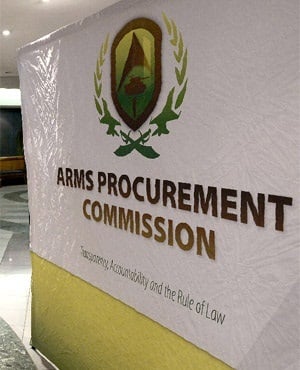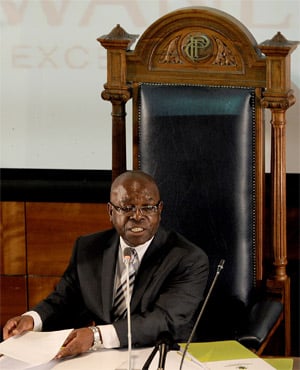
Every South African patriot would have had their chest puffed up and a lump in their throats during the air displays at President Cyril Ramaphosa’s inauguration in May.
The displays included some of the SA Air Force’s most lethal firepower.
By the end of the show, there were some who were itching for us to attack some vulnerable country.
Just nje.
Alas, our neighbours are all nice people with whom we have shared histories and enjoy sound fraternal relationships.
We are also working with them towards a more intimate common future.
So there is very little we will be able to wipe out in a military installation using our superior weaponry anytime soon.
Apart from patrolling borders and the continental shelf, we will for the foreseeable future be using our arsenal for the noble purposes of peacekeeping, saving drowning villagers after cyclones and engaging in a host of infrastructure duties.
The absence of a discernible enemy is one of the reasons some took a dim view of the 1999 multibillion-rand arms deal right from the beginning.
The logic of those who opposed the arms deal outright was that the nascent republic had way too many other priorities than defence.
Apartheid had left the new order with a dysfunctional country with massive backlogs in all areas.
Rather spend money on those than on weapons, they argued.
They were wrong, of course. All nations need a battle-ready military that can be deployed at short notice.
The military not only secures the country, it is also essential for regional stability.
Peacekeeping and helping our neighbours are some of the things the South African military has excelled at since we became part of the community of nations.
A crucial by-product is an active defence industry, which is a boon for cutting-edge technological development.
Read: The arms deal ghost
For crying out loud, even eSwatini has a military arm. Known as the Umbutfo eSwatini Defence Force, it consists of 3 500 soldiers – fewer than the members of Cape Town’s Hard Livings gang, but a defence force nevertheless.
Our neighbour even has an air force comprising about nine aeroplanes, which include potent military machines such as a Cessna, a Learjet and an Airbus.
In decades past, eSwatini even had a navy – one boat that was docked at Maputo. But it apparently got lost and the entire navy was disbanded.
But we digress. The point here is that some opponents of the arms deal conflated their opposition to the corruption associated with it with the belief that the country did not need to refresh its military muscle.
The debate then got muddied as those defending the acquisition – most of them innocent – adamantly claimed that the deal was clean.
Those who were involved in the purchase of jets, vessels and other equipment have said that the primary deal was aboveboard, but that there may have been corruption associated with the secondary stage that involved fittings.
If it was indeed the case that the primary level was totally clean, South Africa would have achieved a historic feat by being the first country since the existence of nation states to conclude a corruption-free arms deal.
The Seriti commission of inquiry into the deal was supposed to put paid to the argument of whether or not there was corruption associated with the primary acquisition.
It did nothing of the sort. Judge William Seriti, then a Supreme Court of Appeals jurist, shamed South Africa’s highly respected judiciary by presiding over a sham of an inquiry that was designed to shore up the official narrative that the arms deal was virtuous.
Even someone with a brain the size of a typical Donald Trump supporter could have worked out that Seriti and his team had a mandate to achieve a predetermined outcome.
This was a great tragedy because Seriti had been a highly rated lawyer and a well-regarded judge before this process.
What possessed him to throw away his gilded name in pursuit of a negative cause is a mystery. But throw it away he did.
History will remember Seriti not as a fearless lawyer or a judge who made rulings that made the powerful quiver.
His name will forever be associated with the white-washing of corruption. The damning judgment that set aside the findings of the Seriti commission is the ultimate ugly blot on his name.
Read out by Gauteng Judge President Dunstan Mlambo last week, the judgment from a full Bench found that the commission fell short of the objective of investigating “with an open mind to reveal the truth to the public on a matter of utmost public importance ... which had bedevilled the constitutional democracy in this country since its dawn”.
There was “clear failure to test evidence of key witnesses” and “a refusal to take account of documentary evidence which contained the most serious allegations which were relevant to its inquiry”, the judges found.
While the setting aside of the findings does not end the debate about the probity of the arms deal, it discredits those who waved it as the final word on the matter.
Now that the commission has been discredited, so has the narrative that it supported.
We will most likely never fully know what really happened in smoke-filled rooms, nor will the money that changed hands be traced.
It would be foolhardy and too prohibitive to launch a new investigation.
Anyway, the behaviours of Jacob Zuma and the Guptas, as well those of the many who stole from us, are much fresher in our memory.
But at least we know that, somehow, this deal made us lose our innocence.
| |||||||||||||
| |||||||||||||




 Publications
Publications
 Partners
Partners









